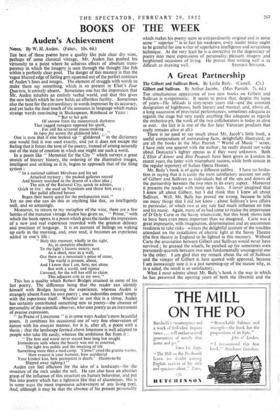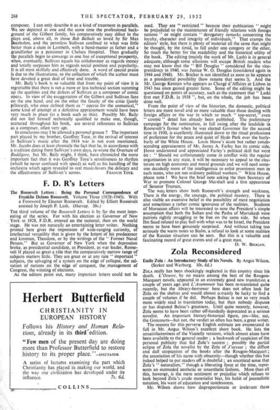A Great Partnership
The Gilbert and Sullivan Book. By Leslie Baily. (Cassell. 42s.) Gilbert and Sullivan. By Arthur Jacobs. (Max Parrish. 7s. 6d.) THE simultaneous appearance of two new books on Gilbert and Sullivan is symptomatic. It seems to prove that, despite the lapse of years—The Mikado is sixty-seven years old—and the constant denigration of highbrows, both literary and musical, „and, above all, a long succession of provincial performances, sometimes adequate as regards the stage but very rarely anything like adequate as regards the orchestra-pit, the work of the two collaborators is today as alive as ever. (In fact it is one of the few later Victorian products that really remains alive at all.) There is no need to say much about Mr. Jacob's little book, a useful compendium of outstanding facts, delightfully illustrated, as are all the books in the Max Parrish " World of Music" series. I have only one quarrel with the author ; he really should not write about Donizetti's lighter operas as if they were unknown. Both L'Elisir d'Amore and Don Pasquale have been given in London in recent years, the latter with triumphant success, while both remain in the regular repertory of Italian Opera Houses. Mr. Baily 's book is of quite a different calibre. I have no hesita- tion in saying that it is easily the most satisfactory account not only of Gilbert and Sullivan as individuals but of the ups and downs of the partnership between the two men in its every aspect. Moreover it presents the reader with many new facts. I never imagined that I knew all about Gilbert, but I did think that I knew all about Sullivan. Well, Mr. Bally has proved me wrong, because he tells me many things that I did not know ; about Sullivan's love affairs • in particular, of which two at any rate had much influence on him and his music. Again, many of us had come to realise the importance of D 'Oyly Carte in the Savoy triumvirate, but this book shows him to have been even more important than we imagined. Carte was a great impresario, with imagination, determination and an uncommon readiness to take risks—witness the delightful account of the troubles attendant on the installation of electric light at the Savoy Theatre (the ffrst theatre in England to be lighted in this manner). Without Carte the association between Gilbert and Sullivan would never have survived ; he greased the wheels, he patched up (or sometimes even prevented) quarrels between two men fundamentally uncongenial one to the other. I am glad that my remark about the oil of Sullivan and the vinegar of Gilbert is here quoted with approval, because I am increasingly sure it is a just summing-up of the reason why, as in a salad, the result is so satisfactory. What I most admire about Mr. Baily's book is the way in which he has presented the opening years of both the librettist and the cpmposer. I can only describe it as a kind of treatment in parallels. We see depicted at one and the same time the professional back- ground of the Gilbert family, his comparatively easy debut in the plays and, above all, in those Bab Ballads so loved by Sir Max pwrbohni, and the penniless Sullivan confined to what was little better than a slum in Lambeth, with a band-master as father and a • grandfather as a pensioner in Chelsea Hospital. Then gradually the parallels begin to converge in one line of exceptional prosperity, When, eventually, Sullivan equals his collaborator as regards money and totally surpasses him as regards social position and popularity. It is all most skilfully and effectively done. A word of special praise is due to the illustrations, to the collection of which the author must have devoted a great deal of time and trouble.
Mr. Baily's book is so valuable that from my point of view it is regrettable that there is not ,a more or less technical section summing up the qualities and the defects of Sullivan as a composer of comic .opera. In view of the exaggeration of the Gilbert and Sullivan fans on the one hand, and on the other the fatuity of the critic (justly pilloried), who once defined them as "operas for the unmusical," some kind of attempt at a definitive appraisement would have been very much in place (in a .book such as this). Possibly Mr. Baily did not feel himself technically qualified to make one, though, scattered throughout his book, are several references to Sullivan as a composer, often very apt.
In conclusion may I be allowed a personal grouse ? The important part played by my brother, Geoffrey Toye, in the revival of interest in Sullivan's music after the 1914 war is not even mentioned. Mr. Jacobs does at least chronicle the fact that he, in accordance with a tradition dating from Sullivan's own days, re-wrote the Overture of Ruddigore, but Mr. Baily might, I think, have chronicled the more important fact that it was Geoffrey Toye's sensitiveness to rhythm (which he never confused with speed) as well as his handling of the orchestra which again revealed to real music-lovers the delicacy and the 'effectiveness of Sullivan's scores. FRANCIS TOY&



































 Previous page
Previous page